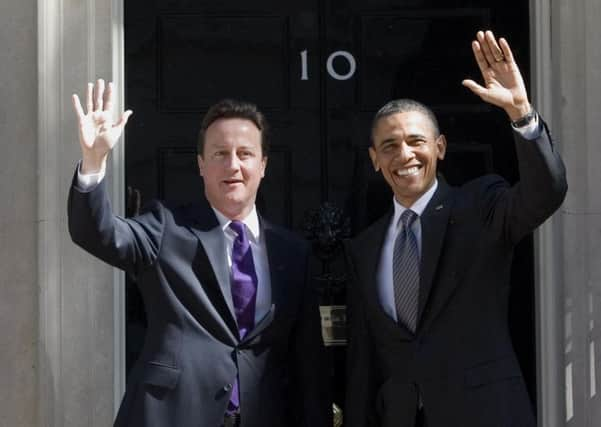Ted Bromund: Why the US fails to grasp British disquiet over EU


IF it made any difference to the debate, President Obama’s recent press conference with the Prime Minister appears to have boosted the Brexit cause. Obama’s intervention is just the latest incident in the history of American failures to realise why Britain is better off out than in.
To understand America’s approach to the EU, it helps to realise that it’s simply not a top-tier issue in the United States. It’s not even a second-tier issue.
Advertisement
Hide AdAdvertisement
Hide AdAfter all, we’re not in the EU, and for most Americans, the EU is about as relevant as Fifa or the British Cheese Board. The EU doesn’t produce the TV we watch (that comes from Britain), or the chefs we like (also British). And no one dreams of being a tourist in Brussels. (We dream about London).
In Britain, Europe has been a subject of controversy since the late 1950s. It’s been central to British politics since the late 1980s. Journalists write regularly – ceaselessly, even – on it, and political careers have been made and broken by it.
Europhiles will say that Britain isn’t fair to the EU – but Britain does talk about it. When Americans ask me why Brexit is a live option in Britain, most of them assume it’s because of the immigration issue. That’s important. But the basic reason is because Europe’s been an issue in Britain for decades.
As a result, there’s a base of awareness about it that’s completely lacking in the US, So how, exactly, do Americans think about the EU and Brexit, when they think about it at all?
Advertisement
Hide AdAdvertisement
Hide AdWell, the EU does help its cause a bit at the elite level by propagandising effectively in Washington, where EU visits are routine and where Brussels isn’t shy about spending money.
But really, most American sentiment to the EU – and these are elite sentiments, since there isn’t enough popular awareness of the EU to count – come down to three basic points and one underlying attitude.
First, there’s the ever-popular theory that the US is better off if Europe has a single point of contact. Henry Kissinger didn’t actually ask for Europe’s phone number in the early 1970s, but the joke captures a reality: Presidents since Eisenhower have longed for a Europe that gets its act together.
The US hope has been that a united Europe would be a stronger Europe, a better partner in Nato, and able to bear a greater share of the burden of its own defence. Obama recently continued this tradition by blasting David Cameron as a free-rider on Libya.
Advertisement
Hide AdAdvertisement
Hide AdThe problem is that the more Europe has unified politically, the less interested it has become in either defending itself, or supporting Nato. The EU wants control of European foreign and security policies not to make them more effective, and certainly not to back up Nato, but simply so it will be in charge.
Second, there’s the equally popular US theory that Britain is a kind of Trojan horse inside the EU, working on behalf of the US, or for Anglo-American values more broadly. In a way, this is a kind of compliment to Britain, because it implies that we don’t trust the continentals to do the right thing.
From this US point of view, Europe without Britain is protectionism, wars, and – ultimately – American boys storming the beaches of Normandy. Or perhaps it’s Europe with Soviet (or Russian) tanks driving over it, or Eurocommunists (or Euro-fascists) running European capitals.
This point of view does have a certain plausibility: after all, D-Day did happen.
Advertisement
Hide AdAdvertisement
Hide AdIf Britain could turn the continent in a truly liberal direction, perhaps being a cat’s paw wouldn’t be so bad. But if Britain had that kind of power, the EU wouldn’t exist in its current form.
What happens in practice is that the EU’s top-down model contaminates Britain’s liberalism, while at the same time breeding far-left and far-right populism on the continent. If the EU is a cure for illiberalism, why has political extremism in Europe advanced in step with the EU?
The third and last US theory is obvious: The EU is the United States of Europe, and the founding of the EU is akin to 1776. The fallacies of this are equally obvious: the US is a nation in a way that Europe simply is not. It has too much history for that.
All three of these US theories are old. One dates to 1776. The others were born in the early Cold War. And that is the problem: since the US doesn’t think much about the EU, it decided on its approach to Europe almost 70 years ago, and hasn’t returned seriously to the subject since then.
Advertisement
Hide AdAdvertisement
Hide AdThe answer in Europe isn’t the EU. Nor is it the illiberal populism the EU fosters.
The answer is the nation-state, governed by the people through constitutional and democratic processes. And that is precisely what the EU rejects.
Until the US understands that, it won’t understand Brussels – or Brexit.
Ted R. Bromund is a senior research fellow in Anglo-American Relations, based at The Margaret Thatcher Center for Freedom at The Heritage Foundation in Washington.